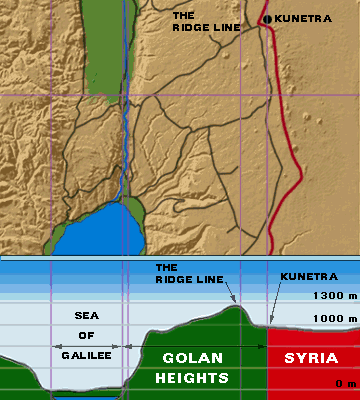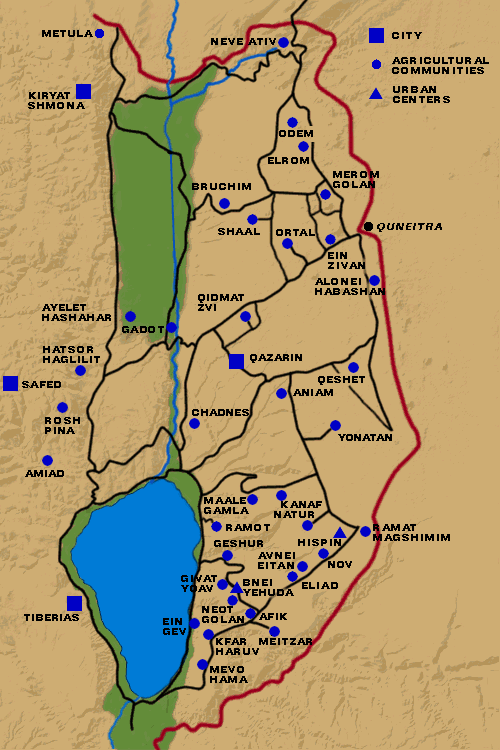Is the Notion of Syria Getting Back the Golan a Pipe Dream?
Posted by Joshua on Friday, November 30th, 2007
IsraeliGuy, a frequent commenter on SC, reminds us that the notion of Syria getting the Golan back is wildly unpopular in Israel, where the region's wines, skiing, and happy life-style have become a much-loved feature of Israeli life. Clinging to the Golan in Israel is not just about security, it is life-style. Israelis just want to have fun. Here are the poll findings:
Golan is a brand representing affordable, young, quality wines providing excellent value for money. |
Post Annapolis poll – some real figures from a real survey in Israel. From the article: “On the question of Syria, 62 percent said Israel should engage in talks with its foe, while 35 percent opposed.
But 69 percent said they opposed Israel giving up the Golan Heights plateau — captured from Syria in 1967 and demanded back by Damascus in any peace deal — in return for full peace, with only 28 percent supporting the move.”
To the full article, which includes more figures.
Here is what AnotherIsraeliGuy adds:
As I see it, there will be no war in Lebanon or Syria, for the next 5 years. Hizballah cannot afford a war and neither can the Syrian regime. Given that, Israel is not going to rush to make any deal with Asad. The deal Israel is looking for is a lease on the Golan and a flip. This is very far from the Syrian position. Barak has just said that he will not leave the government and induce elections because then Netanyahu will be elected. The chances of a deal with Syria in the next 5 years are slim to none.
Aluf Benn sums it up in haaretz:
There is a new idea dominating public discourse: Israel will recognize Syrian sovereignty over the Golan Heights and hold the territory under a long-term lease agreement. The towns and military camps will stay in place, with a Syrian flag over them, and in the meantime we will see whether the Syrians behave themselves, conduct a neighborly policy and maintain a stable regime. This way we can stay on the Golan and feel as if it isn't ours, fulfill the Israeli dream of not being suckers, talk with the Syrians and give them nothing for it. Peace in return for peace.
The initiative of sovereignty/lease is backed by ministers Avigdor Lieberman and Meir Sheetrit. They were joined late last week by MK Ami Ayalon, who is a candidate for the leadership of the Labor Party and is trying to shake off his leftist image and outflank his rival, Ehud Barak, who nearly returned the Golan to Syria seven years ago. The three disagree on one thing: Lieberman is proposing a leasing agreement for a period of 99 years, Sheetrit will make do with 25 years, and Ayalon told Gidi Weitz in an interview for Haaretz Magazine he is talking about "50 or 80 years."
Those in the know and who are familiar with the detailed history of the negotiations with Syria say Damascus will not agree to such a proposal. They believe that at best it is possible to talk about a shared park over the territory in dispute, along the bank of Lake Kinneret, but not about maintaining Israeli infrastructure over the entire Golan.
Before Bashar Assad is asked about his opinion, it is worthwhile to point out four problems inherent in the leasing idea. "The British also leased Hong Kong." That is not accurate. Britain occupied Hong Kong during the Opium Wars and established there a Crown Colony with Chinese agreement for an indefinite period of time. Later the British leased more territory (the "new territories") for 99 years. At the end of the lease period, Britain restored to China the territory it had leased, as well as the colony. Unlike the Israeli occupation of the Golan, which brought about the displacement of most of the Syrian residents there and the destruction of their villages, the British kept the Chinese residents in place and even looked after their rights, and did not settle in their place farmers from Devonshire and Scotland.
Zubaida says:
Regarding the wineries, it may or may not be relevant that the Syrian Economy Ministry earlier this month authorised the import of wine, beer, cider, spirits and liqueurs as part of the government's avowed commitment to trade liberalisation.(Syria-News.com November 22nd)



Discover more from Syria Comment
Subscribe to get the latest posts sent to your email.


“…Prime Minister Ehud Olmert’s offer to Syria to return the Golan Heights in a directly negotiated land-for-peace deal again raises a big question for fans of Israeli wine. What might become of the Golan Heights Winery?
…Attention focuses on the 5.4m-bottle winery, because it is generally deemed Israel’s best. Its Yarden, Gamla and Golan labels are famous internationally. Yarden wines made their mark in America in the 1980s by inspiring a kosher wine revolution, reshaping preferences from sweet to dry.”
Speculation centers on a hope that Damascus might be open to a peace treaty that allowed the Golan Heights Winery and others to remain in operation on the plateau, perhaps under a long-term lease arrangement.